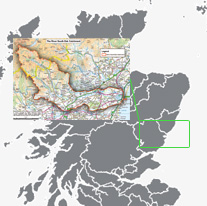Ship noise puts fish in danger
Noise made by passing ships stops eels from using their survival instincts, say NERC-supported scientists investigating the effects of man-made noise on fish.
The study, published in Global Change Biology, found only 38% of the eels that were exposed to ship noise responded to an ambush from a predator compared to 80% in normal ocean conditions. Even those that did react were 25 per cent slower than normal.
'Over the past 20 years eel populations have declined by 90 per cent due to climate change. The eels are spawned in the Sargasso Sea, and then spend 18 months finding their way back to Europe. To do this they have to cross busy shipping lanes and acute acoustic events, like the noise of a passing ship, may be adding to the problems they have to overcome,' says Dr Steve Simpson of the University of Exeter, lead researcher on the study.
The team tested the eel's response to two types of predators, ambush and pursuit.
'One is an ambush predator, which comes from nowhere and tests the startle response of the eel, and the other is a pursuit predator - where we chased the eels while unaware of what the eel was receiving,' explains Simpson.
The ambushed eels were 50 per cent less likely to respond when the predator attacked, and those being chased were caught twice as quickly as eels which weren't distracted by the noise.
'Acoustic disturbance clearly has a serious impact on these endangered animals with direct consequences on their life-or-death behavioural responses,' says Simpson. 'We don't know if the noise is just distracting them or if they're stressed by it, but either way they're failing to respond to a potential predator.'
To understand what stress the noise places on the eels, Simpson and his colleagues also tested their metabolic rates, rates of ventilation - how quickly they beat water over their gill – and their preference for using their right or left sides.
'In the same way we write using our right or left hands, fish have a preferred side to approach a predator or to stay next to shoal mates with. We watched each eel as it explored a maze in ambient conditions to classify its right or left bias, then we exposed half to ship noise and half to more ambient noise. Their preferences went away when they were exposed,' says Simpson.
The team suspect this means ship noise affects eels' cognitive processes, which could mean other processes, like learning, may also be affected. Alongside raised metabolic and ventilation rates, the scientists note the stress being caused by the shipping noise is similar to the levels fish exhibit in ocean acidification studies.
'We know shipping isn't going to stop, but we can do things like move a shipping lane so it doesn't interact with the migrations paths of animals,' Simpson suggests.
'It's a pollutant we have more control over than something like atmospheric carbon dioxide,' Simpson says. 'These animals are having to deal with all the stressors globally, so if we can alleviate just one it might give the animals more resilience to other stressors like ocean acidification, which will come later.'
The research was funded by Defra and the Natural Environment Research Council.
Anthropogenic noise compromises anti-predator behaviour in European eels by Steve Simpson, Julia Purser and Andy Radford is published in Global Change Biology.



